QUBE-Servo 2
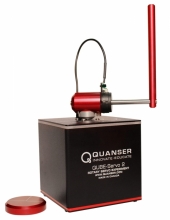
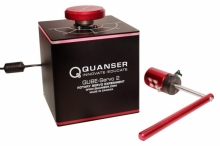
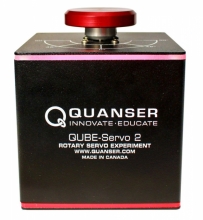
The Quanser QUBE™-Servo 2 is a fully integrated, modular servomotor lab experiment designed for teaching mechatronics and control concepts at the undergraduate level.
Same as the physical QUBE-Servo 2, the virtual system features a DC motor with the inertia disk and inverted pendulum modules. Rotary encoders measure the angular position of the DC motor and pendulum. The motor angular velocity is measured through a software-based tachometer.
QLabs Virtual QUBE-Servo 2 is a fully instrumented, dynamically accurate virtual twin of a classic QUBE-Servo 2 system. It behaves in the same way as the physical hardware and can be measured and controlled using MATLAB®/Simulink® and other development environments. QLabs Virtual QUBE-Servo 2 can enrich your lectures and activities in traditional labs, or bring credible, authentic model-based lab experiences into your distance and online control systems course.
QLabs Virtual QUBE-Servo 2 is available as a 12-month, multi-seat subscription. The platform is compatible with the physical QUBE-Servo 2 curriculum which covers over 30 concepts including modeling, parameter identification, position, and speed control, lead control, stability analysis, steady-state error, moment of inertia, pendulum modelling, crane control, and pendulum balance control.
To access and manage your QLabs Controls subscription, log in to your Quanser Academic Portal account.



The Quanser QUBE™-Servo 2 is a fully integrated, modular servomotor lab experiment designed for teaching mechatronics and control concepts at the undergraduate level.
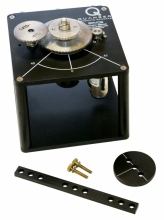
The Rotary Servo Base Unit is the fundamental element of the Quanser Rotary Control experiments. It is ideally suited to introduce basic control concepts and theories on an easy-to-use and intuitive platform. Use it on its own to perform several experiments, or expand the scope of this unit by adding on other modules to teach an even wider range of control concepts.
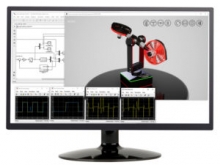
QLabs Virtual Quanser AERO is a fully instrumented, dynamically accurate virtual twin of a Quanser AERO system. The platform is compatible with the physical Quanser AERO engineering curriculum.
